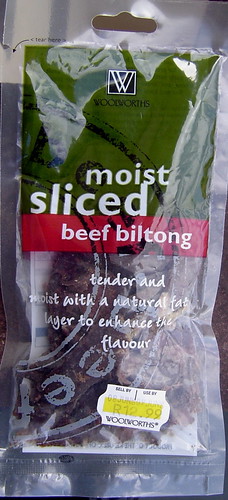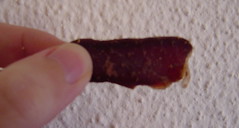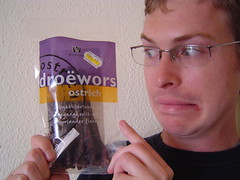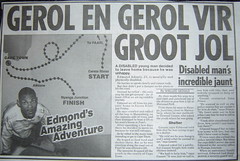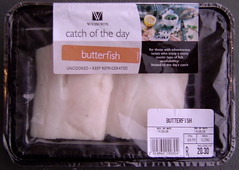Our apartment complex is finally starting to fill up to capacity, and that has meant the departure recently of Nine-Fingered Philip, our sort-of security guard.
The apartment building was newly remodeled when we moved in nearly two months ago, and we arrived on the second day that the builders said it was habitable. But the residents of the other units were a little slow to move in, and for several weeks there were perhaps three or four apartments occupied in the entire complex of 21 units.
Construction had been completed on the unoccupied units, including the installation of the stoves, which are
a precious commodity here. So, as much for the sake of the empty apartments as for the human inhabitants of the building, the builders hired Philip to watch over things. His only apparent responsibility was to conduct late-night rounds, walking past our door every hour late into the evening.
But he was here, it seemed, pretty much all of the time. And that was a little creepy. He was a gaunt man, weather beaten and rather gruff, with a pussy sore on his left earlobe, and he could usually be found sitting in a lawn chair under the open door of one of the covered parking bays, which was his home for as long as he had the job.
I liked Philip at first, though Katie always found him a little too weird.
Nonetheless, despite her personal misgivings about the man, she was even more appalled than I was over his living conditions, there in the parking bay, with a slab of foam for a bed and with no electricity to power his space heater as winter set in.
In any case, he'd be there in the mornings when Katie and I left together on our way to drop her off at school, and he'd be there 30 minutes later when I got back. He'd be there when the mail came, and he'd bring it up to me, knocking on the door and handing it to me with a flourish. He'd ask me where I was going if I left, and he'd ask how things had gone once I came back. His hovel was directly across from our assigned parking space, so there was no avoiding him.
Not that I was always looking to avoid him. Some days, I'd ask him to tell me what was in the Afrikaans newspaper, gossip about who was moving in next, or chat about the weather or where he was from or whatever popped into my head. Once, I asked him to be on the lookout for the guy who was coming around to install someone else's blinds, and Philip dutifully corralled him for me and arranged for the guy to hang all our blinds for next to nothing. I tipped him 20 rand-about three bucks-for the favor, and he smiled at me and said, “Oy! Thanks, man.”
I was always vacillating back and forth between wanting to establish some boundaries so he would stop expecting to have a lengthy conversation every time he brought the mail by the apartment, and wanting him to think of me as his buddy, so I could ask him the one thing I was most curious about: his missing middle finger.
It was hard to miss. He was a habitual chain-smoker, and he'd hold the cigarette between his pointer finger and his ring finger, close his eyes and take a deep drag, giving me plenty of time to stare. And when he'd knock to announce his arrival every afternoon for the mail delivery, he'd wave at me through the frosted glass window next to the front door. Well, he wouldn't wave, exactly. He'd yell “oy!,” hold his hand up, and I'd count.
“One, two, three, four... yep, that's Philip,” I'd sigh, and open the door.
If it was anyone else, I wouldn't have been able to recognize them through the frosted glass, but Philip and his hand were hard to miss.
It was around the time that I had resolved to get to know him better that he started making such intimacy impossible. He started getting weirder.
First, upon returning from the store one day with a bottle of wine among the assorted groceries, we caught him staring at an outdoor light bulb directly in front of the entrance to someone else's apartment. We watched as he stared, and stared, and then suddenly reached up with a bare hand and grabbed a moth. He turned to us with a crooked grin, examined our shopping bags and said, “Oy! Enjoy your drinks.”
Yeah. Thanks.
Next, we saw him going through the trash. Our trash. Twice.
Then came the days he was oddly silent, and would watch us from his lawn chair as we descended four flights of stairs and walked to the car. We'd say hello, and he'd just stare. We'd quickly get into the car, shut the doors, and, without looking at each other--because Philip was still looking at us--one of us would mutter a low “okaaaaaay.”
Philip vanished one day last week. Most of the apartments are occupied now, and his job as watchman of the unoccupied units had become unnecessary. A neighbor told us he was supposed to leave at least a week before he finally disappeared, and that the builder had confiscated his electric gate opener that gave him access to the complex. But he hadn't left right away, even though he was no longer getting paid. He'd shut off the gate from the inside if he was leaving, which allowed him to open it with a push upon his return.
That last week of his residency, it was windy here in Cape Town, and it rained a lot, but Philip continued his evening patrols. It would have been a good plot for a horror movie: weird caretaker with a grudge wanders the grounds of an apartment complex late at night, his disfigured body casting eerie shadows on the window when the sky is illuminated by lightening.
No one got murdered in our building, as far as I know, but maybe in the movie version, the clueless police could be perplexed that every victim had their finger cut off.
With these sorts of things going through our heads, I suppose it's a little redundant to say we're glad he's gone, even if I never did get the story of the missing finger.
But he hasn't really left. Not entirely. Sometimes, late at night when the wind is howling down off the mountain, I think I can still hear his plaintive cry in the darkness.
It sounds like this: “Oy!”
